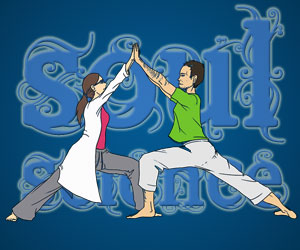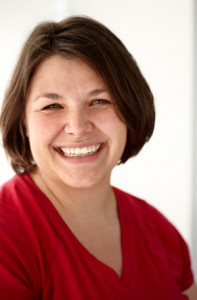Soul Science: Where Biological and Complementary Research Meet
by
 I am a huge fan of scientists and of yogis.
I am a huge fan of scientists and of yogis.
I have spent the last 14 years absorbed in the world of life science. I’ve spent many hours talking w/ scientists about their experiments, their labs, and their lives. This helped me define a career focused on customer service, sales, market research, and finally social media. The best part of my job is when I get to spend time talking to scientists about their research and careers.
About nine years ago, I started taking my health very seriously. I began w/ a very ambitious weight loss program that included yoga and began a second love affair with the practices (postures or asana, meditation, using a neti pot) associated with a yogic lifetstyle.
Science and Yoga seem to be two entirely different beasts. They dress differently (t-shirts with om symbols vs. t-shirts with DNA helices on them). They smell different (LB Broth vs. Nag champa).
Yet, the people of these two very different cultures DO agree on the following statements:
- Let’s improve the world and the health of its inhabitants
- Experiment until you determine the right method for a situation
- A failure is a success because you’ve learned something
- Curiosity is always an asset
- Amazing discoveries happen when you say, “That’s weird…” and not “EUREKA!”
- Most outcomes are vastly different from your predictions
That brings us to “Soul Science”. The goal of this column is to find where the biological sciences and yoga currently overlap successfully, and hopefully learn where they are headed. I’m interested in pulling out good science, and useful yoga/alternative healing techniques and learning why they work from both perspectives.

Kristy Meyer, yoga and science enthusiast
I’ll do so by talking to scientists who experience and/or research the effects of yoga, and reporting back where I see them converging.
Who knows what we’ll uncover!?
.
.
Stay tuned tomorrow for the first Soul Science article: Genetics and Tantra, featuring Ingrid Borecki, Ph.D.!
.
.


steph
wrote on May 30, 2012 at 2:05 pm
My research involves long hours in front of the computer, so in graduate school I started doing yoga primarily because I always felt my muscles were tight and uncomfortable. I was totally surprised by the mental clarity and relaxation I felt after my first class and I've been practicing ever since!
Kristy Meyer
wrote on June 1, 2012 at 8:20 am
Hey Steph! Cool that you were able to get your relaxin' on!! What kind of yoga do you practice? Thanks for reading!!
steph
wrote on June 1, 2012 at 10:49 am
I do Kundalini, mainly because that was what I was introduced to by my friend originally and it seems to work for me. Do you have any recommendations of other styles that might be worth trying based on your experience?
Kristy Meyer
wrote on June 3, 2012 at 7:46 pm
Wow. So you are already very familiar with kriya, breath of fire, etc. That's an unusual beginning!
Are you interested in deepening a physical practice (I.e. do lots of interesting poses, and gain strength or flexibility)? Or would you like to move towards a quieter practice ( I.e. use poses to still the mind and meditate)?
steph
wrote on June 6, 2012 at 2:20 pm
Yes, in hindsight I realize it is much more intense than some of the other forms of yoga I've talked to friends about since. I am actually pretty happy with the balance of physical and mental right now, but if I had to pick between the two for which one I'd like to go deeper into, I would say it would be to further still the mind and meditate. Funny, because I originally got into yoga for the physical relief!
Kristy Meyer
wrote on June 8, 2012 at 10:56 pm
That is funny! But also is a very natural progression w regular practice. Rod Stryker was my first introduction to meditation practices, and I like his practical approach… Let me know what you think of this article. http://www.yogajournal.com/lifestyle/369
If his philosophy appeals to you, you can find a local teacher at parayoga.com.
His teacher's school has fantastic online resources for meditation. http://www.himalayaninstitute.org/study-online/fr…
And they have some nice articles on asana. They are gentle ways to work with energy. The focus is often on softening and relaxing in order to better understand the mind.
http://www.himalayaninstitute.org/yoga-internatio…
Veena Ugargol
wrote on June 3, 2012 at 4:30 am
Hi Kirsty, great column! I'm a yoga teacher and yoga therapist for mental health, I teach people yoga and mindfulness practises to help them manage symptoms of stress, anxiety, depression and/or post-traumatic stress disorder (PTSD) and to help people who feel psychologically well but would like to develop their wellbeing.
I'm also a researcher (am happy to share my research with you, please feel free to email me) and I study neuroscience and a lot of what I do takes into account what we understand about how some of these practises can alter brain activity. Whilst mindfulness research is well established, yet still growing, we're a little behind on the yoga front, but thats what's so exciting as there's a huge amount of work going on right now to understand the mechanisms behind yoga practises.
So, it seems great minds think alike as I've also just started a blog that brings these 2 worlds together – please feel free to check it out at: http://www.veenaugargolyogatherapy.com/a-meeting-…
Kristy
wrote on June 4, 2012 at 3:41 pm
Veena- I tried to send an email via your site above, but was unable to. Could you email me at [email protected]? THANKS!
k
Kristy Meyer
wrote on June 3, 2012 at 7:48 pm
Hi Veena! Iam really excited to hear about your work and am enjoying your blog as well! Let's chat. I shal email you immediately :)
endisnizo
wrote on August 2, 2012 at 6:50 pm
;))))